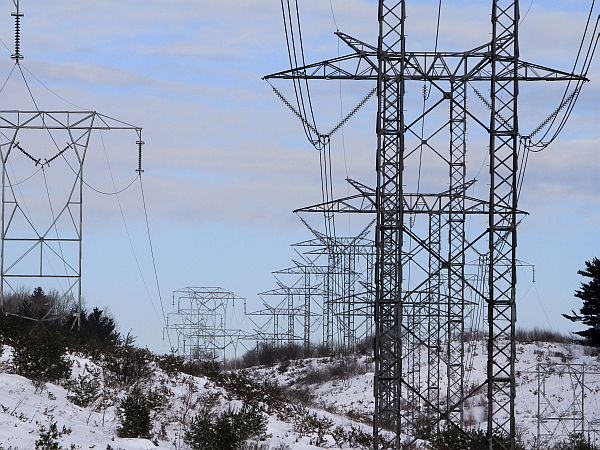
(Host) Canada has positioned itself to become a larger part of New England’s power equation.
Over the weekend, Governor Peter Shumlin toured hydroelectric projects in Labrador that could provide power to the U.S.
And earlier this summer, Quebec’s largest natural gas distributor announced a deal to buy Vermont’s largest electric utility.
Gaz Métro already owns the state’s second largest utility, Green Mountain Power.
The developments have renewed questions about whether Vermont will be a pathway in the future to carry more Canadian power to markets in southern New England and New York.
As Nancy Cohen of Connecticut Public Radio reports, there’s an appetite for that power in Boston, Hartford and elsewhere.
(Cohen) Southern New England states have some of the highest electric rates in the country. And Connecticut has the unhappy ranking of being number 1 in the continental U.S. Residents, like Wanda Cummings of New Haven have very high monthly bills
(Cummings) "My average run me about $120 a month maybe. In the summer it’s probably $225, anywhere over $200."
(Cohen) When Cummings flips on her light switch the electricity isn’t necessarily generated in Connecticut. It could come from anywhere in the Northeast. Paul Hibbard is a consultant to the energy industry and is the former Chair of the Massachusetts Department of Public Utilities. He says there’s an opportunity for electric generators from other places to feed the New England market, if the price is right.
(Hibbard) "If I’m in Canada and I can sell power into southern New England for a price that’s cheaper than generation elsewhere in New England than I’m able to capitalize on that opportunity at the expense of another generator elsewhere in the region. So there’s always a market for the sale of lower priced power throughout the region."
(Cohen) Utilities aren’t just trying to lower prices. They’re also trying to limit pollution. So the type of generation is key. States have big goals to reduce greenhouse gas emissions. Some environmentalists question whether large hydro can do that. But Mark Sylvia, the Commissioner of the Massachusetts Department of Energy Resources, says it can. His state plans to cut more than 5 percent of its emissions through imported electricity.
(Sylvia) "Clean energy imports. Focusing on things like large scale hydro from Canada are all part of what we believe are part of a solution that will enable us to reduce our green house gas emissions."
But Sylvia doesn’t want Massachusetts ratepayers to be stuck with the bill for building towers and lines to move the electricity south.
(Sylvia) "To bring power down from Canada or from other locations it’s important that the transmission costs not be born by Massachusetts ratepayers."
(Cohen) Some of those big lines already exist in Vermont. But they’re not adequate to accommodate more large-scale purchases of power for southern New England. But in New Hampshire a big transmission project is proposed for just that purpose
(Peress) "Whenever we look at the notion of importing our way into meeting our policy objectives we have to consider who those imports are burdening and who is benefiting from those burdens."
(Cohen) Jonathan Peress, with the Conservation Law Foundation says the proposal calls for building 100-foot towers through part of the White Mountain National Forest. He says these impacts could be minimized in New Hampshire and any other northern state, for instance, by burying power lines.
(Peress) "Those decisions need to be made in a way that protects those communities, the value of rural life and the scenic resources in those states."
(Cohen) Kevin DelGobbo, Chairman of Connecticut’s Public Utilities Regulatory Authority says that no state is an island when it comes to electricity.
(DelGobbo) "This is not, from my perspective, an issue of just bringing power south."
DelGobbo says it’s about building a regional system that everyone can count on.
(DelGobbo) "I understand if you’re in Vermont or New Hampshire that you’re saying, ‘Wait a minute, why do we have to feel this impact for stuff that’s going to potentially benefit Connecticut, Massachusetts or Rhode Island?’ The first core priority is making sure that the system, regionally in New England, is reliable for all New England residents."
(Cohen) DelGobbo says Connecticut would be interested in electricity from north of the border only if it is renewable. That need to integrate a power supply that’s free of fossil fuels is what’s drawing southern New England towards Canada.
For VPR News, I‘m Nancy Cohen.